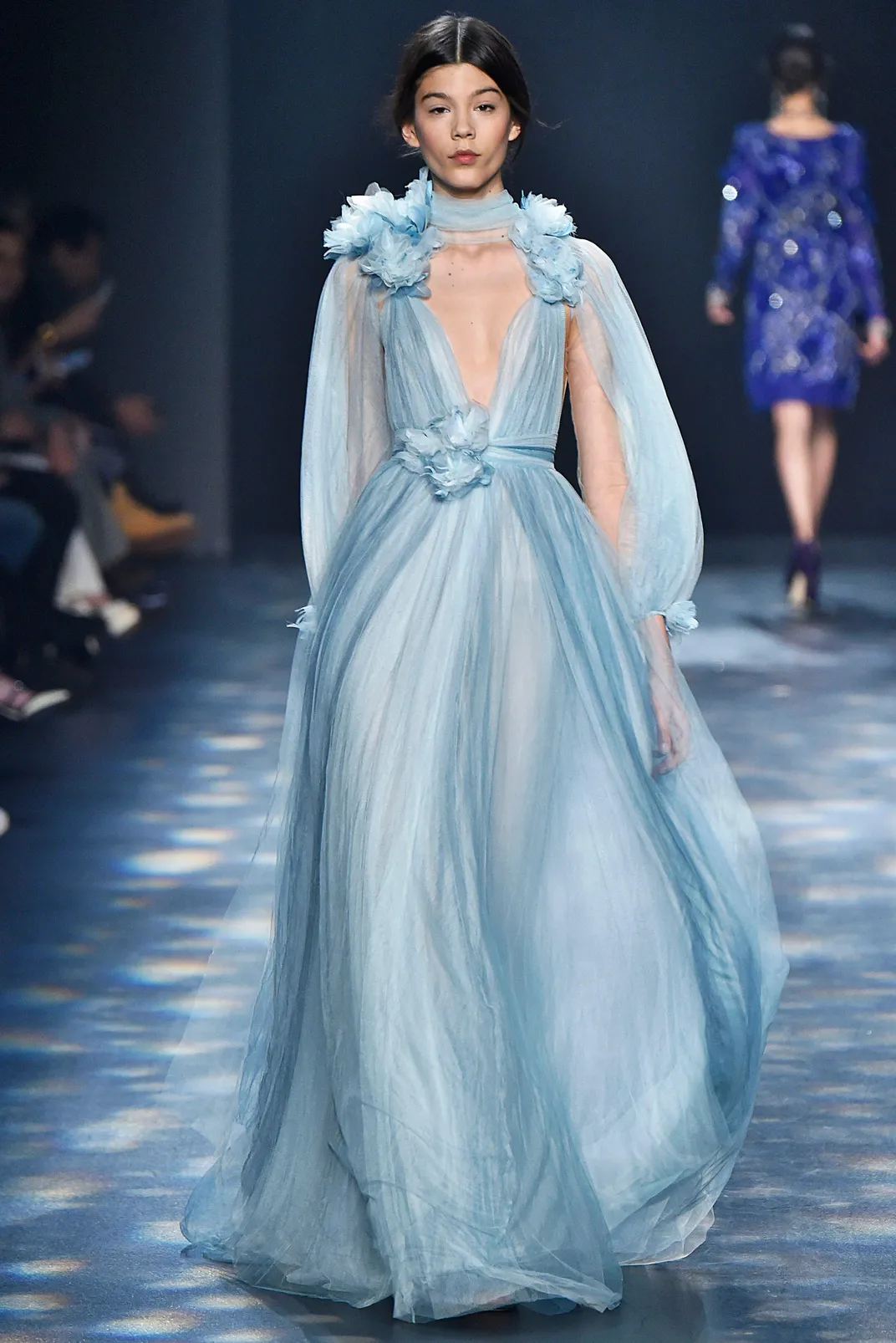Constance Wu’s ‘Crazy Rich Asians’ Dress Is Coming to the Smithsonian
Curator Theo Gonzalves says he hopes the gown will enable Asian American visitors “to see themselves in the museum, … see themselves in American history”
/https://tf-cmsv2-smithsonianmag-media.s3.amazonaws.com/filer/05/24/052421d4-a0ef-49d1-8657-69b693731608/5b749dcb2000002c0034a71f.jpeg)
All too often, the history of Asian Americans in film is one of stereotypes. The Washington Post’s Ada Tseng has a roundup of relevant examples, from white actress Luise Rainer’s 1935 casting as a Chinese American over actual Asian film star Anna May Wong to the more recent whitewashing controversy surrounding Scarlett Johannson’s casting in Ghost in the Shell.
That’s what made Crazy Rich Asians, a 2018 romantic comedy based on Kevin Kwan's book of the same name—and the first major Hollywood film to feature an all-Asian cast since 1993’s The Joy Luck Club—a landmark achievement in representation. Now, the Cinderella-esque sky blue gown worn by Constance Wu’s character in the film’s climactic wedding scene is set to the join the ranks of such pop culture treasures as Judy Garland’s ruby slippers, a Kermit the Frog puppet and original cartoons by Peanuts creator Charles Schultz, all of which are housed at the Smithsonian’s National Museum of American History.
In an interview with Smithsonian.com, Theo Gonzalves, a curator of cultural and community life at the Museum of American History, calls for more stories that “allow us to tell the complexity, the fullness of what it means to be Asian and Asian American.”
“A lot of audiences out there, especially the younger ones, can't really remember the last time they saw a nearly all Asian American cast,” he says. “It shouldn’t be an event every 25 years.”
Crazy Rich Asians centers on Wu's Rachel Chu, a Chinese American economics professor who discovers her boyfriend Nick (Henry Golding) belongs to one of Singapore’s wealthiest families after arriving in town for a friend’s wedding. The film was a box office hit, earning more than $238 million worldwide, and was widely hailed for its extravagant visualization of a world occupied by the upper echelons of Singaporean society. To tell this story, Vulture’s Tomris Laffly points out, fashion was used “to both articulate and poke fun at wealth.”
The bride-to-be (Sonoya Mizuno), for example, dons a gold sequin jumpsuit for her bachelorette party and follows up this disco-themed outfit with a multi-layered jumpsuit-turned-dress, accented by thousands of Swarovski crystals, during her actual wedding. Nick’s disapproving mother Eleanor (Michelle Yeoh), on the other hand, opts for understated, elegant looks that nevertheless evince wealth. At the other end of the spectrum, Rachel’s friend Peik Lin Goh (Awkwafina) and her “new money” family wear exaggeratedly flamboyant looks, including a gold-trimmed Versace tracksuit and dog-patterned pajamas.

“The film’s use of fashion is not merely decorative or secondary,” Gonzalves explains in a Smithsonian statement. “The cast’s clothing plays a crucial role in marking social class among its characters—from multi-generational moneyed elites of Peranakan (Straits-born Chinese immigrants), to the nouveau riche strivers of Singapore, to working-class Chinese immigrants in the United States and their Asian American model minority progeny.”
Rachel herself undergoes a dramatic fashion evolution throughout the movie, abandoning the simple frocks she brought from home for increasingly upscale outfits. The dress that will be donated to the Smithsonian—a flower-adorned, Grecian-style floor-length dress, complete with a deep V-neck, cinched waist and flowing tulle—is worn during a moment of triumph where Rachel stands up for herself in the ongoing battle with Eleanor, finally cementing her sense of control in an unfamiliar world.
“It became literally a fairy-tale dress for people,” director Jon M. Chu tells the Los Angeles Times’ Jen Yamato in an exclusive interview. “We talked about how this would make her feel and how powerful it would be for her—and that it’s also her choice to wear.”
Marchesa, the couture house behind the gown, originally designed the dress for the brand’s fall 2016 collection. Although the runway version had long sleeves, costume designer Mary E. Vogt tells Vulture’s Laffly the team decided to remove them to make Rachel look “vulnerable” during the wedding scene.
The donation ceremony is set to punctuate “The Party: A Smithsonian Celebration of Asian Pacific Americans” on May 18, an inaugural iteration of an annual celebration of Asian Pacific Americans’ contributions to music, film, sports and the culinary arts hosted by the Los Angeles-based Smithsonian Asian Pacific American Center.
One young fan of the movie, an Asian American girl named Olivia, already received a homemade recreation of the gown from her mom, Ha.
“This is the first time I’ve made a costume where it gave me the chills,” Ha wrote on her blog, “seeing her see herself in someone who looks like her. … It’s like seeing the future.”
Gonzalves echoes this statement, saying he hopes the original dress Rachel wore will inspire similar reactions when it goes on view in D.C.
“I want them to be able to see themselves in the museum,” Gonzalves tells Smithsonian.com. “I want them to see themselves in American history.”
/https://tf-cmsv2-smithsonianmag-media.s3.amazonaws.com/accounts/headshot/mellon.png)
/https://tf-cmsv2-smithsonianmag-media.s3.amazonaws.com/accounts/headshot/mellon.png)